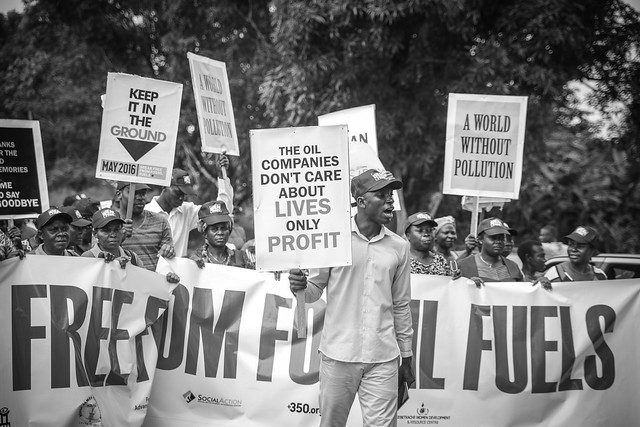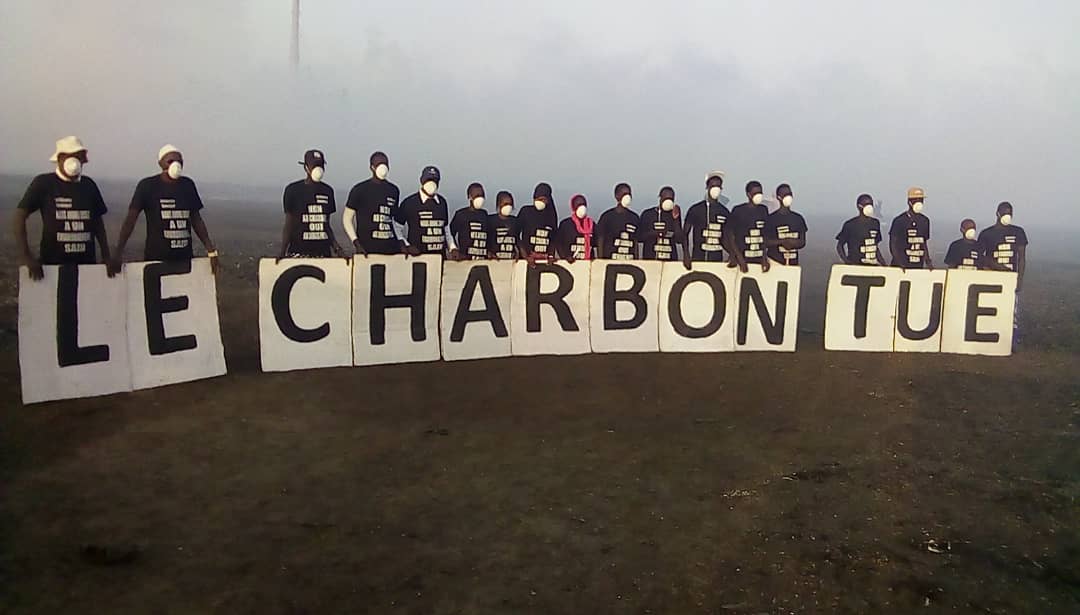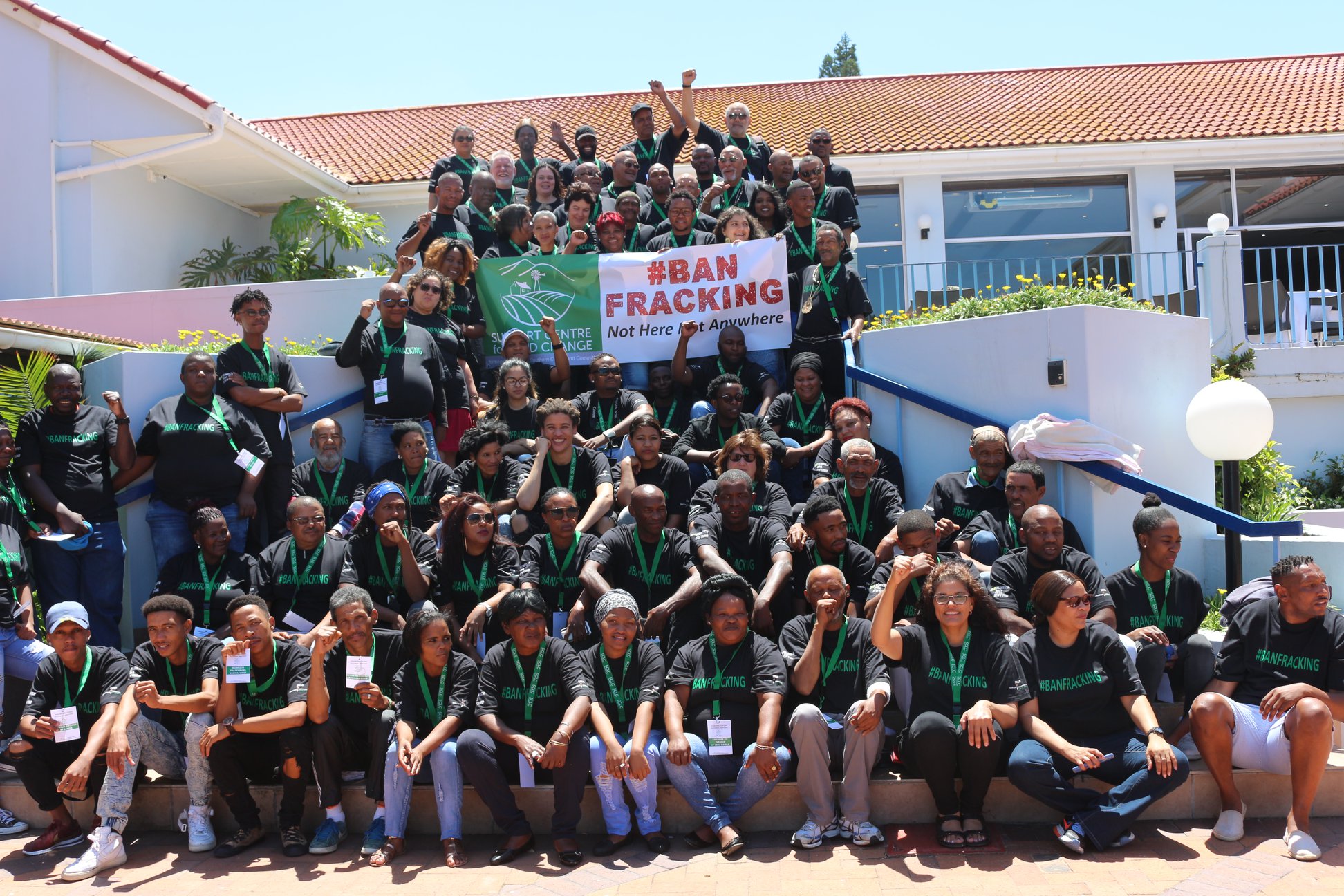We’re days away from rising up calling on our leaders to fight climate change.
We’ve seen throughout history that movements that promote progressive social change have been driven by ordinary people dedicated to leading when governments have failed. People power leading the way has become even more relevant as the effects of climate change have begun to unravel across Africa, as leaders across the length and breadth of the continent prop up the importation and exploitation of fossil fuels.
As part of Africa Day, on May 24-25 we will see the determination of people, in communities across Africa rise up against new fossil fuel exploration, and developments - showing leaders the way to fight climate change. So far there have been over 50 events registered across the continent calling on their leaders to commit to building a fossil free Africa that puts people and justice before profits.
The movement against new fossil fuel developments is global and extremely pertinent to the future of our planet. Here’s a snippet into what will be happening in Nigeria, Senegal and South Africa on the 25th:
- Nigeria: To mark the Afrika Day of Action, GIFSEP intends to mobilize at least 20 Senior Secondary Schools in Abuja to produce and deliver climate-conscious and justice messages on one parachute and other colourful paintings. This parachute and painting will be delivered through a march towards the parliament building asking the members of parliament to pass the climate bill and lead Nigeria on the road to climate justice.
- Senegal: A huge rally gathering at least 1500 citizens composed of youth, women, traditional chiefs, religious leaders, local authorities, CSOs and NGOs is planned in Bargny to denounce the Bargny coal plant project and to call the Senegalese President to demonstrate a stronger leadership role in fighting against climate change and promote renewables.
- South Africa: Communities affected by mining, and those in support of these communities, will be marching to the Union Buildings in Pretoria. A memorandum calling for a national ban on fracking in South Africa will be handed over to the President and to the Minister of the Department of Mineral Resources.
Our collective futures depends on us being able to seize this moment and work together to pushback against the fossil fuel industry fuelling the climate crisis and for long-lasting and meaningful change.
Video: #ThumaMinaDBSA Petition Delivery Action
On Tuesday 30 April 2019, 350Africa.org along with Earthlife Africa and #ThumaMinaDBSA petition supporters hand-delivered over 8000 names which support the call for the Development Bank of Southern Africa (DBSA) to publically commit to not finance the Thabametsi coal-fired power plant.
The names were handed over to Paul Currie, Chief Investment Officer at the DBSA who sincerely conveyed how the bank assesses infrastructure financing applications. We reiterated that the banks screening policies are too lenient on prospective coal financing and that the DBSA has a duty to ensure that projects the bank finances are in the wider public interest and that they are not funding harmful and risky projects like coal-fired power stations which speed up climate change.
This delivery does not mark the end of the campaign. It is a tipping point as we ramp up efforts to constructively engage the DBSA on initiating climate-friendly policies that reflect a progressive energy transition that both tackles climate change and delivers upon a prosperous low carbon economy in South Africa.
350Africa.org calls on the DBSA to develop a stand-alone fossil fuel strategy that fully excludes coal and integrates climate change strategies across their operations to meeting South Africa’s fair share of keeping warming to 1.5C as communicated by the worlds foremost collection of climate scientists.
While the DBSA through the Green Climate Fund (GCF) facility appears to be taking comprehensive action on climate change and the transition to a low carbon economy, the bank is not moving fast enough to contribute to South Africa's Nationally Determined Contribution (NDC) to keeping warming well below 2C - an NDC which is itself far short of South Africa's fair share of keeping warming to well below 2C never mind 1.5C. To date, the bank's approach to climate change has not been ambitious or clear enough to avoid catastrophic climate impacts.
350Africa.org challenges DBSA to play a stronger role in ensuring that South Africa is doing its fair share in a global effort to slash carbon emissions to net zero by 2050 and ensure that South Africa is not left behind as the country’s peers move forward towards a fossil free future.
“Stop Procrastinating and lip-service, Take Immediate Action” Activists in Ghana tell African Leaders
On the 21st of March, 350 Ghana Reducing Our Carbon took to the streets together with Ghana Youth Environmental Movement, Green Africa Youth Movement and other climate justice organisations like PACJA, Peasant Farmers Association of Ghana, Friends of the Earth Nigeria to demand real climate action.
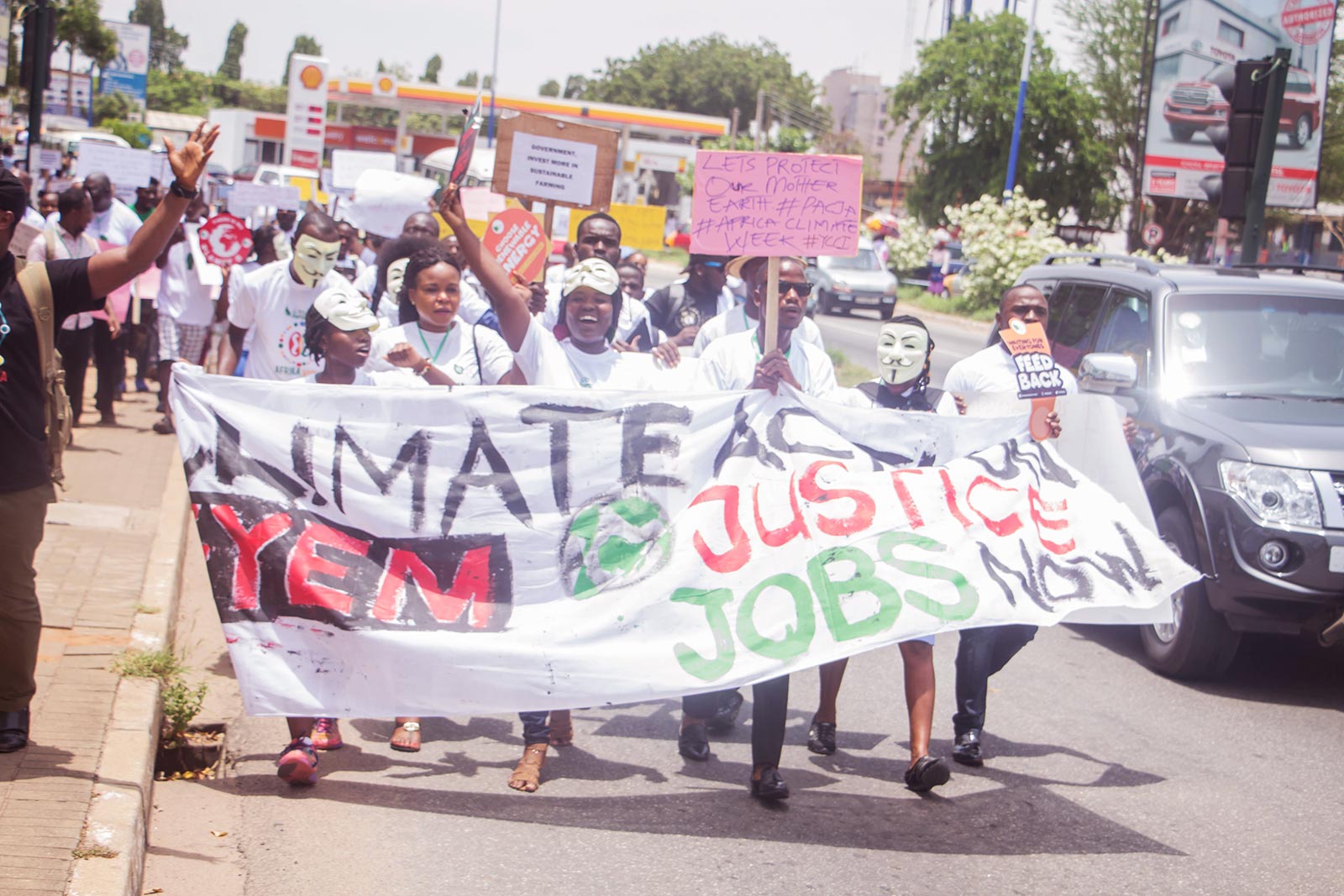
The action was amongst a series of activities by the 350 GROC team in response to the proceedings of the Africa Climate Week hosted by the government of Ghana from 18 - 22 March. The summit’s aim was to enhance engagement between State and non‐State actors in the key sectors of energy, agriculture and human settlements.
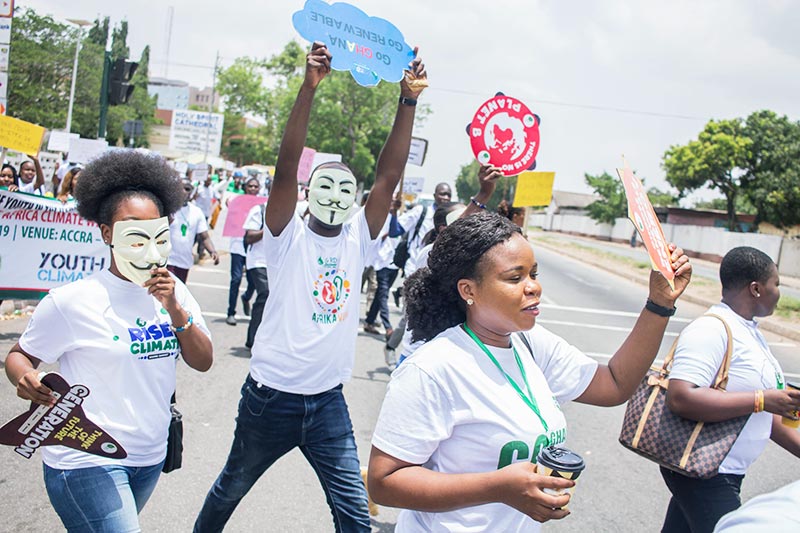
The activists in Accra clearly expressed their opposition to fossil fuels and carbon markets, saying that such false solutions have no place in the new dawn of Ghana, and Africa if we have to combat climate change and achieve the goals of sustainable development.
Before that action, a press conference was held where 350 GROC and its partners asked their government to stop the lip-service and accelerate the energy transition towards 100% renewables.
Although there were no solid commitments from the Africa Climate Week, 350 GROC committed to continuing to push the Ghanaian government to be ambitious and not delay the transition for a 100% renewable energy future.
- Rukiya Khamis
Nedbank officially Cuts Ties With Coal
In January 2019, Nedbank announced their clean break away from financing coal-fired power plans by committing to not finance Thabametsi and Khanyisa, which form part of South Africa’s first round of Coal Baseload Independent Power Producer Programme.
This announcement followed a 2018 declaration that the bank will no longer provide project financing for coal fired power stations excluding the Coal IPP’s which they had committed to.
The Coal IPPS have been embroiled in multiple long-standing legal challenges that have delayed financial sign-off and culminated in the expiry of varying proposals by a syndicate of South African banks to finance the coal IPP’s.
It is now official that Nedbank has ‘undertaken not to provide project financing or other forms of asset-specific financing where proceeds would be used to develop new coal-fired power plants’. This is a momentous step in the right direction for South Africa makes Nedbank the first Africa based bank to use their financial might to cut ties with coal and prioritize their expertise on helping to deliver on the transition to a low carbon economy through scaling up on renewable energy investments.
We welcome the banks intentions to ‘make change happen’ and deliver on the diversification of electricity supply. In South Africa coal accounts for 77% of electricity output. However, the country’s coal dependency has come at a heavy price, with Witbank, situated in the country’s coal belt being labelled as one of the worst places in the world for air pollution.
With the country’s slow progress in shifting to cleaner power projects in recent years, it is our hope that Nedbank's commitment accelerates the financial services sectors’ will to initiate reforms that fully exclude fossil fuels from lending and investment policies.
Youths in Nairobi oppose the proposed coal plant project in Lamu: Advocates for green energy
On 14th of March 2019, youths in Nairobi took a dire initiative to oppose the 1,050 megawatts coal plant project. A project under Amu Power Company (a special purpose joint venture of Gulf Energy and Centum Investment) is to be established at Kwasasi Village in Hindi Division, Lamu west.
With their placards raised high, the youths walked through the University of Nairobi from end to end hiking the awareness of the harmful flip of the project. They talked one on one with students as they gave out the factsheets that had well-defined details of the intended project. The project is prospected to beget harmful health and environmental effects, livelihood effects on communities, unprofitable and unsound economics and violation in licenses.
Additionally, the youths had alternative solutions on their placards that could be put in place instead of the detrimental project. They vehemently advocated for green energy as they passed the same knowledge to fellow youths.
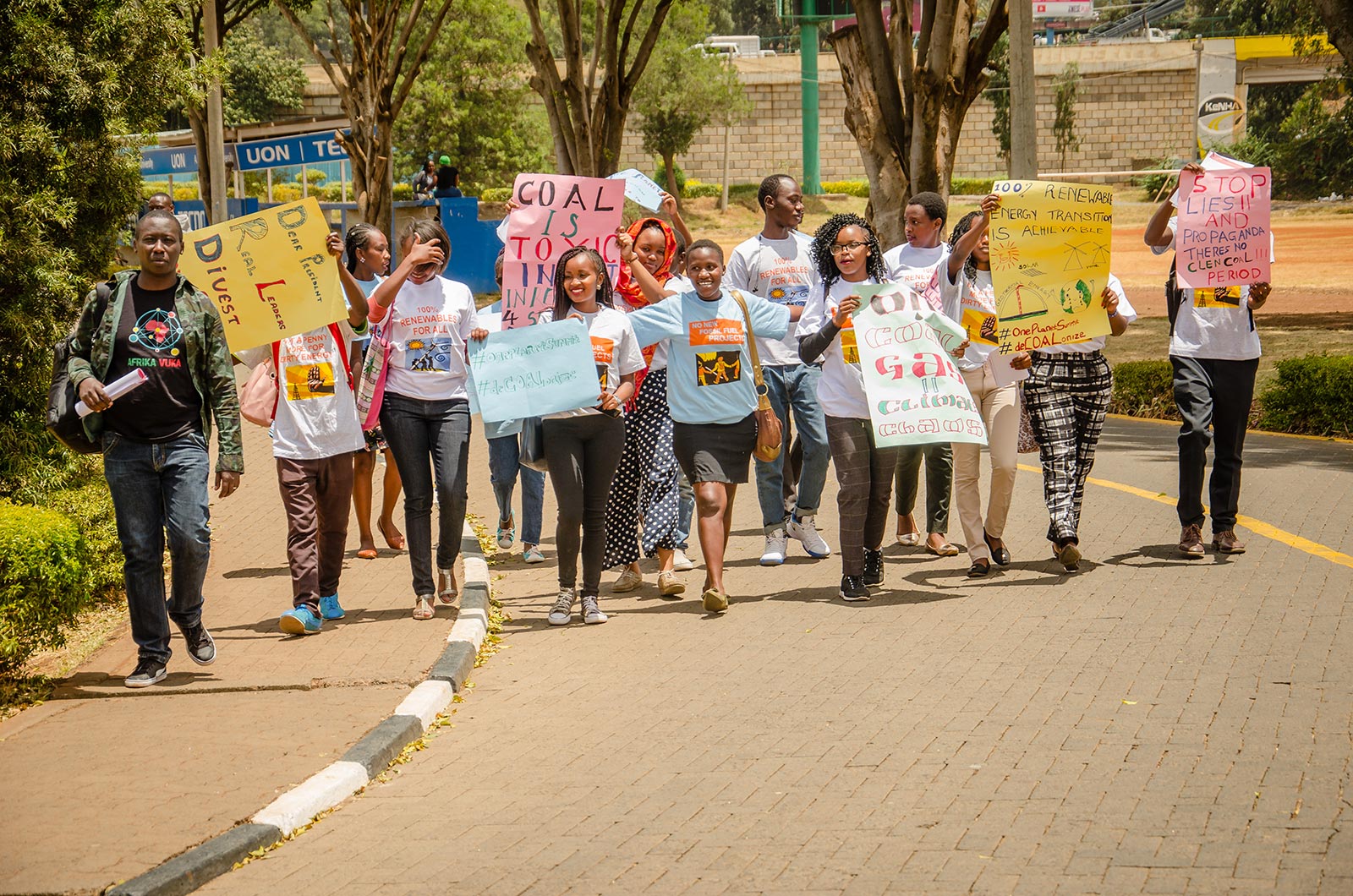
The youths roundly tweeted their dissents using the hashtag #deCOALonize and #OnePlanetSummit. They directed their messages and awareness to The Kenya Government and French Government following the 3rd global One Planet Summit that was taking place in Nairobi Kenya at the United Nations.
Today in #Kenya, the One Planet Summit kicks off. The Summit's goal is to accelerate and step up climate action for Africa. One of the main sponsors is the African Development Bank, who has yet to make this commitment. Ask the AfDB to go 100% renewables https://t.co/Azg0dSpwMf pic.twitter.com/LazAwnbIwT
— 350 Africa (@350Africa) March 14, 2019
The Summit was geared to focus on ways to accelerate and step-up climate action in Africa and specifically on expanding renewable energy, protecting biodiversity, and boosting adaptation and resilience.
Activist groups such as Save Lamu, Lamu Youth Alliance, deCOALonize Coalition, NGOs etc. have been campaigning tirelessly to stop the building of the proposed coal plant in Lamu, Kwa Sasi region. This was an effort under 350 in support of the deCOALonize campaign and is one of many to come strategic actions, to #deCOALonize Kenya.
- Ian Elroy Ogonji, 350Kenya Volunteer.
AMOS WEMANYA: Coal-fired power a needless burden
Kenya’s energy sector has made promising developments. This year is set to be an exciting one for electricity consumers. There has been a notable shift in the direction the government wants to take for investments in the country's energy future. This move is contrary to the initial plans to invest in the dirty coal power plant in Lamu and mining in Kitui. President Uhuru Kenyatta has promised to lead Kenya to 100 per cent clean energy by 2020.
350Africa Welcomes Nedbank’s Clean Break Away From Coal
Following years of portraying themselves as a green bank, Nedbank has demonstrated their willingness to Make Change Happen and address climate risks by withdrawing from financing Thabametsi and Khanyisa, two proposed coal fired power plants that form part of governments Coal Independent Power Producer Program (CIPPP). This announcement follows a 2018 declaration that the bank will no longer provide project financing for coal fired power stations excluding the Coal IPP’s which they had committed to.
The Coal IPPS have been embroiled in multiple long-standing legal challenges that have delayed financial sign off and culminated in the expiry of varying proposals by a syndicate of South African banks to finance the coal IPP’s.
With reports of Standard Bank instructing the Department of Energy (DOE) that they will stop funding the construction of any new coal fired power stations in September 2018, and Nedbank's 2019 announcement, the Development Bank of Southern Africa (DBSA), ABSA and the First Rand Group have not yet been bold enough to renounce their shared commitment even though their respective mandates to finance the coal IPP’s have expired.
In a welcomed move, Nedbank is gearing up to walk their talk by prioritising future energy financing for projects in energy efficiency and renewable energy. This is a move that sees the DBSA - a state owned development finance institution, that is yet to accelerate sustainable socio-economic development, lagging behind commercial banks. It is our hope that the DBSA will soon make a clean break from coal fired power and use its financial prowess to further scale up their investments in renewable energy and climate solutions, together with breaking free from the shackles of coal fired power stations which exacerbate the climate crises.
350Africa, in collaboration with the Life After Coal campaign launched the #ThumaMinaDBSA campaign in March 2018 targeting the DBSA. Referencing president Cyril Ramaphosa’s New Dawn speech, we’re calling on the Development Bank to “lend a hand” in the fight against climate change, and commit to not funding Thabametsi. Please add your voice to the call.
Why we’re Breaking Free from fossil fuels on the 25th of May
We’re gearing up in South Africa and together with groups from all over the continent to #BreakFree from fossil fuels on the 25th of May - Africa Day. With groups hosting events in many different countries, we hope it will be a day where we demonstrate that African people do not want fossil fuels.
This is why we think this work is so important:
- Fossil fuels are killing us. Burning of coal for electricity causes terrible air pollution which has been shown to be responsible for illness and deaths among those affected.

- Climate change is impacting our continent hardest, displacing people and destroying livelihoods.
 Image © AlJazeera
Image © AlJazeera - We believe a more equitable energy future is possible. Renewable energy has the potential to put the power of generation in many people's hands, not only a few.

- We need a united voice. There are many African people and groups working to end the age of fossil fuels in Africa, if we all come together at the same time though, our voices are more powerful. deCOALonise.africa was started in order to do this.

What are your reasons for getting involved? We’d love to hear them.
You can help us by joining an event near you, or hosting your own event. Can you believe that our very own African Development Bank is financing coal-fired power plants all over Africa? Join us in showing them that we want to deCOALonise our continent!


